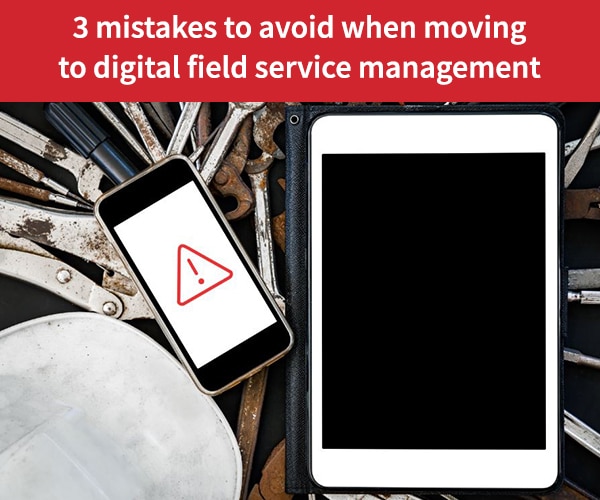
- Field Service Management
- Field Service Software
- Finance
- ISP
- P&L
Navigating ISP Growth – Part 1: Transformative effects of FSM on P&L

NAVIGATING ISP GROWTH. PART I: FROM COSTS TO REVENUE
Over the past several years, the telecommunications industry in the US has been focused on closing the digital divide and making sure every household has access to broadband services. Federal and local funding have been used to support several technologies, but it is fair to say that a strong focus has been put on fiber, as many argue is the most future-proof technology.
Challenges in ISP Growth
The growth of ISP business is accompanied by several challenges that impede the ability to scale effectively and maintain the quality of services. While some are operational, others are technical or customer-related and require strategic solutions for sustainable growth.
High Customer Expectations
In a highly digitalized world, your customers have exceptionally high expectations about the promptness and seamlessness of their service. This means they expect an installation to occur almost instantly, the internet to be reliable, and any issues to be resolved immediately.
Managing High Volume of Service Requests
The number of customers for a given ISP is growing considerably, leading to more installation, maintenance, or troubleshooting orders. Therefore, an ISP business trying to scale operations may experience overload and slow response rate issues, no matter how well-organized your operation is.
Resource Allocation
When expanding operations, the ISP company must ensure that the right service personnel with the necessary skills and equipment are in the correct geographical position at the right time.
While a field service scheduler can easily manage the job of a small ISP without any specialized software, resource allocation becomes a significant challenge as the scale of operation grows, leading to severe inefficiencies.
Cost Management
For ISP companies looking to grow profitably, it’s crucial to evaluate operational cost-effectiveness and tackle inefficiencies such as eliminating wasteful processes and cutting unnecessary expenses. Ignoring these issues can lead you to poor performance and loss of competitiveness.
Data Management and Integration
Finally, an ISP must be able to collect, manage, and integrate considerable amounts of information on orders, customers, and service planners to remain efficient. Poorly managed data can have a counterproductive effect on your efficiency through errors and a slow response rate.
Evolving KPIs and the Critical Phase for ISP Businesses>
Despite – or perhaps because of – the amount of public funds invested, the industry has seen a shift in the past several months. As an increasing number of miles of fiber are laid out, the main KPI that investors and specialists are typically focused on is the number of homes passed, viewed from a capital expenditure (CAPEX) perspective. However, as the industry and the economy as a whole enter a new phase, there is now an emphasis on KPIs that impact all aspects of the P&L including: take rates, customer satisfaction (C-Sat) and churn.
This phase of economic unfolding is critical and, if not handled properly, can make or break an ISP business. It represents a period of growth in customers, related installations, and maintenance operations and the skills required from a field perspective during this phase are even more challenging than those needed for the construction phase. You will have to deal with an increasing high volume of shorter and customer-facing jobs, which present challenges where field service management solutions play a crucial role, especially in regard to your revenue growth, profitability and long-term scalability.
This is the reason why any broadband service provider entering or expecting to soon enter this phase should carefully consider field service management (FSM) as a key tool to leverage to improve its P&L. In this post, we will explore how proper FSM software can significantly impact your financial KPIs.
Converting Homes Passed into Active Subscribers: Prioritizing a Seamless Customer-First Experience
The first and most important challenge of this new phase is to convert your homes passed into active subscribers. In that phase the customer-first experience will be critical.
You want to ensure that your prospects who are not yet active subscribers but have expressed interest in your offering have the most streamlined experience possible. The main reason is that if you are building your network, you may be competing with incumbent providers who have all the infrastructure in place and can accommodate a new request very quickly.
You don’t want your customers’ experience to feel like you are far behind. This applies to the appointment booking process for the first installation, the communication with the customer until the installation is completed, and the behavior of the field technician who will perform the job, whether it is in-house or through a contractor. It will also be critical to ensure that the job is – as much as possible – done right the first time.
Impact of FSM on ISP Growth
First and foremost, FSM software is crucial to managing the growth of ISPs. The growth and expansion of the ISP business customer base, along with expanding coverage of services that build the initial issue, are becoming increasingly complicated.
The specialized FSM software provides a comprehensive solution of assistance automating and ensuring the most effective delivery of field services.
One key advantage of FSM software is its scalability, which aligns with your business’s growth trajectory. As your business expands, a FSM software can seamlessly handle the increasing number of orders, services, technicians, and clients, ensuring smooth operations at all times.
Automated scheduling and dispatch, a key feature of FSM software, offers significant benefits. It saves time that would otherwise be spent on manual job posting, allowing you to focus on other critical tasks. This automation also ensures that technicians can be swiftly dispatched to the site of another job, enhancing overall efficiency.
You can view how the work is done in the field in a centralized way and at the palm of your hand. Simultaneously, if there was a problem, you could view and solve it similarly.
Essential Field Service Software Capabilities
While the best FSM software may not address every issue, it can significantly assist you. Here are the main essential capabilities that you’ll want to verify:
1. Appointment booking capability:
An appointment booking capability that easily integrates via open field service APIs is critical. It is likely that the installation process will be part of a larger process involving your NOC (for drop validation for instance), your finance team (credit validation), your sales team, etc. It is even better if the system offers self-service capabilities, ones that you can embed in your website, or via a standalone customer portal. In order to guarantee that the promised service will be delivered, you will need to make sure that the slots made available are determined using real-time data regarding skillsets, geographical locations, availability, travel durations, etc.
2. Integrated real-time notification capability:
This can be, for example, a text message sent to the customer when the technician is on his way to the job location, or automated reminders sent a day, if not a couple of hours, in advance.
3. Integrated workflows capability:
For each job type, you will want to make sure that the technicians get specific instructions while they perform the job. This will require conditional logic, controls over the quality of the data captured, and has to be delivered in a step-by-step manner via a field service mobile app. This ensures that your field teams deliver the best customer service, regardless of their seniority or contractual status. Additionally, the workflows should possess the capability to trigger a line testing process, directly from the field service mobile app.. This process aims to validate the correct installation and provisioning of the new customer in the network, ensuring that the installation is done right the first time.
If a situation arises that the technician is not able to solve without support, the FSM solution should give the technician access to remote, video-oriented, assistance provided by an expert working with the NOC, for example.
4. Offline mode capability:
These workflows should include the ability to work offline to address situations where the job is performed in an area with little or no connectivity.
5. Scheduling and Dispatching:
The effectiveness of FSM software depends on efficient field service scheduling and dispatching. Advanced FSM systems use existing conditions, real-time data, and artificial intelligence to dispatch jobs to the most suitable technician without manual operation.
Based on engineer availability and skills, the task must also be dispatched to the nearest available technician for field service route optimization. Such a method reduces human intervention, prevents conflicts, and enhances efficiency.
Future of FSM in the ISP Industry
With the development of FSM technologies, their significance for the ISP business industry will also increase. Here are our predictions for what FSM may be in the future:
Increased Automation
Scheduling, dispatching, and reporting will be performed automatically, while field technicians will only have to deal with complex problems and interact with customers. In addition, AI, IoT, and the many data points available will also facilitate their work, helping them better understand customers and predict their issues.
Enhanced Customer Experience
Automation and analysis can also help service providers to give more personalized services, creating a good impression of caring for customers and solving their problems before they start to complain. They will also help predict customers’ needs and handle them to provide better solutions than traditionally required.
Improved Operational Efficiency
Using systems based on AI, Iot, and data analysis will help ISP businesses run more effectively and allocate their resources more efficiently. As systems are optimized, their effectiveness will significantly grow your ISP business.
Scalability and Flexibility
FSM’s future is expected to involve developing more flexible and scalable solutions to help internet service providers respond to changes in demand or expand their service areas quickly. Cloud based field service management software will likely become more popular, forcing adaptation to changes in these areas.
Integration with Emerging Technologies
As time passes, more technologies will emerge, and FSM will likely be integrated with many of them, such as AR for remote assistance and data sharing or blockchain for secure storage.
Conclusion
These examples illustrate how the best field service management software positively impacts your customer experience, guaranteeing a smooth and efficient installation process. This, in turn, increases take rates and your active subscriber base while influencing the top-line KPIs of your P&L.
We all know, as consumers, how important the first impression is. To stay ahead of the competition and grow your revenue, you need to provide a best-in-class customer experience. Satisfied customers not only leave good reviews, driving new business, but they are also more likely to purchase other products (wi-fi, data protection, etc.) that can be bundled into your offerings, generating additional revenue.
Ensuring a best-in-class employee experience for your field technicians is also critical, as they play a pivotal role in your service delivery. This paves the way for a smooth, consistent and robust transition from the construction phase to the run phase of your network operations. As your business grows, scalability becomes a key consideration, which is the topic of the second part of this article.
DISCOVER THE PRAXEDO ADVANTAGE
Praxedo has been a trusted provider of field service management (FSM) solutions for companies across the globe since 2005. Our success is attributed to our unwavering focus on delivering the best FSM tools in the market. Unlike other providers, we don’t aim to supply all enterprise applications. Instead, we prioritize our expertise in FSM and offer a cloud-based solution that streamlines deployment from start to finish.
Today, more than 1,300 companies including large enterprises and SMBs, and 60,000 users across the globe rely on Praxedo daily to optimize their field service operations. Our solution enables them to increase productivity, optimize resources, and facilitate seamless data exchanges between field personnel such as technicians and engineers, and their dispatchers.
Want to learn more? Schedule a demo today.
Our similar articles.
-
- Field Service Management
- digital transformation
- télécoms
Driving Digital Transformation in Telecoms: Adopting a People-Centered Approach for Future Success
July 27, 2023 -
- Software
- Field Service Management
- Optimization
Deploying field service management software: 3 major mistakes to avoid
January 22, 2020 -
- Field Service Management
- Maintenance
- Work orders
- Secteurs d'activité
How telecom providers can optimize field service
October 2, 2018


